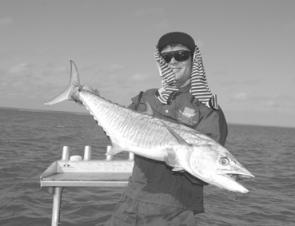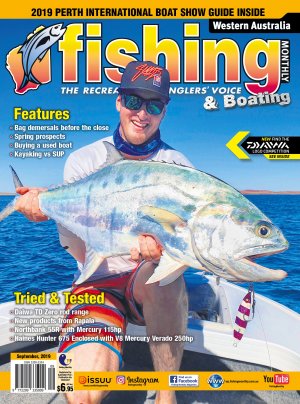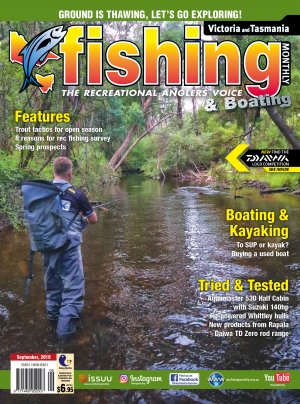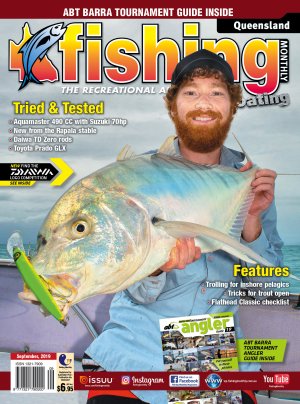No two days fishing are ever the same. That’s one of the great attractions when, like me, you get to spend more of your waking hours on the briny than on the shore! The same applies in the bigger picture as well – no two seasons are ever the same!
Each year seems to favour a different species and, given the complexities of the marine food chain, I’m not about to offer a simple explanation for why that is. The reasons for an increase in activity of a particular species can vary from ideal spawning conditions a couple of seasons back to a change in our fishing techniques.
The almost non-existent ‘wet season’ of 2004/05, combined with the poor ‘wets’ of 02/03 and 03/04 wreaked havoc on many of the Gulf’s popular species and the sharp drop in numbers of species like barramundi, threadfin salmon, queenfish and golden trevally over those years can be directly attributed to the lack of freshwater run-off creating unfavourable spawning conditions. One of the most significant food sources of juvenile fish, the orange clouds of jelly prawns that normally hang along the river and beach edges for 3-4 months during the run-off, were hardly noticeable this year, a sure sign that the marine environment is under pressure.
Thankfully, the marine environment of the Gulf is still in a very healthy state. In 2005, the offshore fishing varied from great to sensational almost all season, with the numbers of big Spanish mackerel landed being the best ever.
There are probably a number of reasons why more mackerel have been taken. For a start, reduced catches in the estuaries have driven us to spend more time offshore in an effort to keep the clients happy. More time spent offshore means we’ve been able to develop better fish finding skills and techniques, and while increased catches of all pelagic species have resulted, sizeable Spanish mackerel have responded best.
The most successful mackerel techniques have involved trolling and jigging. It’s been hard to go past the Halco Scorpion Crazy Deep 150XDD for trolling, although trialing of the new Scorpion 125XDD has found it works just as well.
Fancy colours are all the rage these days but the tropical stand-by of white/red head is still hard to beat in the mackerel stakes. Just in case, I recommend carrying a couple of black/silver/red stripe, the excellent king brown/gold, the chrome/silver multicolour, the green/gold/black stripe and the new yellowfin, most of which have superb holographic finishes.
There’s a lot more effort required to catch mackerel on jigs but the rewards and personal satisfaction can be great. Wire traces are mandatory for any mackerel prospecting, but they can upset the action of the lures. It’s a case of get fewer strikes or lose a truckload of lures, and the choice depends on the depth of your lure box and pocket!
The most successful lures for this type of fishing have been Spanyids, Raiders and Snipers from 50-90g and Lazers from 35-70g. Wire-rigged assist hooks have proved to be just as effective as trebles when the make up of the macko’s mouth is considered.
Even flyfishers haven’t missed out on the fun. Mackerel like a fast moving fly but will often hit on the pause or even on the drop.
Mackerel pieces done in a light beer batter have been featuring on the menu regularly with parties during 2005. If the fish is killed, spiked, bled, iced and filleted properly, macko is very hard to beat as far as tucker is concerned.
Let’s hope that 2006 sees plenty more on the menu!
There has been a lot in the press recently about the increasing numbers of foreign fishing vessels entering our northern waters in search of shark fin and other fish products. Unfortunately, the problem has been allowed to escalate to its current level by repeatedly ignoring the protests of fishers from the Gulf to Broome.
It is now at the stage where it is almost out of control, given the meagre resources of our enforcement agencies. For every vessel that is captured, it seems that 10 more are taking its place.
The cyclone season sees Australian based fishers curtailing their fishing efforts because of unpleasant to dangerous sea conditions. This allows the foreign vessels to roam more freely at that time, something that they seem well aware of.
Senator Macdonald’s handling of this fishery crisis has been abysmal. Do we really need any further proof that government has completely lost touch with what is happening in the oceans that surround it?
While the government seeks to put large slices of our marine environment out of the reach of its own citizens in the name of conservation, it doesn’t stop the wholesale plundering of northern waters by foreign fishing vessels. The handful of customs and fisheries patrol boats operating in the area have been doing a wonderful job with what they have, but need their numbers dramatically increased, not only with the couple of bodies promised – hardly enough to crew a single vessel!
Commercial fishers have already been taking matters into their own hands, and unless we get some decisive action from the powers that be, many of us who live in the region can see violence on both sides escalating in the near future.
Reads: 972
Big Spaniards, like this one, were regular catches in 2005. Derek from the Gold Coast landed this beauty.

Not all mackerel hooked made the boat! In this case, the sharks graciously left us a tidbit.

This foreign shark long line, found less than 8nm off the Weipa coastline, almost filled the back half of a 5m boat!




